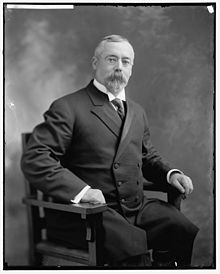William Spry
| William Spry | |
|---|---|
 |
|
| 3rd Governor of Utah | |
|
In office January 4, 1909 – January 1, 1917 |
|
| Preceded by | John Christopher Cutler |
| Succeeded by | Simon Bamberger |
| Personal details | |
| Born |
January 11, 1864 Windsor, Berkshire, England |
| Died | April 21, 1929 (aged 65) Washington, D. C. |
| Political party | Republican |
| Spouse(s) | Mary Alice Wrathall |
| Children | 3 |
| Profession | Politician |
| Religion | The Church of Jesus Christ of Latter-day Saints |
William Spry (January 11, 1864 – April 21, 1929) was an American politician who was the third Governor of Utah. He is the namesake of the William Spry Agriculture Building that houses the Utah Department of Agriculture and Food.
Spry was born at Windsor, Berkshire, England. He emigrated to Utah Territory with his parents at the age of eleven.
He served as governor of Utah from 1909 to 1917. He was a Republican. Spry was a strong opponent of Prohibition, and vetoed two bills that would have implemented this. From 1921 to 1929 Spry served as commissioner of Public Lands.
In 1885, Spry was called as an LDS Church missionary and went to serve in the Southern States Mission. From 1888 to 1891 (continuing his time from being a regular missionary), Spry served as president of the Southern States Mission. In 1890, during his mission, Spry received permission from the leaders of the church to return briefly to Salt Lake City where he married Mary Alice Wrathall.
In 1894, Spry was elected county collector in Tooele County, Utah. In 1902 Spry was elected to the Utah State Legislature and in 1905 he was appointed one of the members of the Utah state board of land commissioners.
In 1915, Spry refused President Woodrow Wilson's request to reconsider the impending execution of Joe Hill and allowed the execution to take place on November 19.
Spry died in Washington, D.C., in 1929 when he was still serving as the Federal Commissioner of Public Lands. He was buried at Salt Lake City Cemetery.
...
Wikipedia
